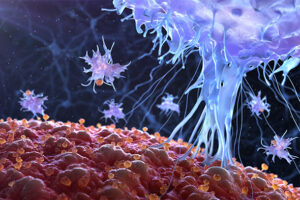Oncology
Prostate Cancer
Novel Antiandrogens and Treatment Intensification for Prostate Cancer
Overview
Barriers seem to persist in the adoption of the standard of care in metastatic castration-sensitive prostate cancer (mCSPC). All contemporary oncologic and urologic guidelines note the need to intensify treatment beyond single-agent androgen deprivation therapy (ADT).
Expert Commentary
Neal D. Shore, MD, FACS
|
|
“The long-standing belief that ADT monotherapy is all that is required in mCSPC is no longer acceptable. Registry data suggest that both urologists and medical oncologists can do better.”
An exceptional amount of beneficial scientific work has led to clinical trials that have changed the treatment of de novo metastatic and recurrent metastatic prostate cancer. The long-standing belief that ADT monotherapy is all that is required in mCSPC is no longer acceptable. Registry data suggest that both urologists and medical oncologists can do better.
From the era of Huggins and Hodges up until several years ago, ADT monotherapy was all that we had for patients with low- or high-volume hormone-sensitive disease. From 2017 onward, we have had exceptional data emerge from global phase 3 trials, all demonstrating that lowering the testosterone level and seeing the prostate-specific antigen go down are not enough to declare victory. That is no longer the standard of care for mCSPC.
The current standard of care is to have full-throated conversations with patients, reviewing the data from the CHAARTED trial; the STAMPEDE multiarm, multistage study of combination therapy for patients with mCSPC; the ARCHES trial; the ENZAMET trial; the TITAN trial; and now the ARASENS trial. Essentially, these studies, all of which were exceptionally well designed and conducted, have shown level 1 evidence indicating that, regardless of low- or high-volume disease, patients should be offered the option for the consideration of ADT in one of several combinations that have been studied and have shown to improve survival. This could be ADT with docetaxel—and now ADT plus docetaxel and darolutamide, which has demonstrated significantly increased overall survival—or it could be another combination, such as ADT plus abiraterone, ADT plus enzalutamide, or ADT plus apalutamide.
Data from these trials have been incorporated in all of the contemporary oncologic and urologic guidelines and treatment recommendations based on the level 1 evidence, and yet many of our colleagues worldwide are still only offering ADT monotherapy. I understand some of the barriers, such as the fact that prostate-specific antigen reduction is viewed as being beneficial and that physicians are very comfortable with educating patients on the safety and tolerability of testosterone suppression. Further, there can also be cost and accessibility issues for some of these therapies. But only performing testosterone suppression, alone, for our patients with mCSPC is no longer acceptable; thus, the intensification is the standard of care right now with novel hormonal agents or docetaxel.
References
Armstrong AJ, Szmulewitz RZ, Petrylak DP, et al. ARCHES: a randomized, phase III study of androgen deprivation therapy with enzalutamide or placebo in men with metastatic hormone-sensitive prostate cancer. J Clin Oncol. 2019;37(32):2974-2986. doi:10.1200/JCO.19.00799
Chi KN, Agarwal N, Bjartell A, et al; TITAN Investigators. Apalutamide for metastatic, castration-sensitive prostate cancer. N Engl J Med. 2019;381(1):13-24. doi:10.1056/NEJMoa1903307
Davis ID, Martin AJ, Stockler MR, et al; ENZAMET Trial Investigators and the Australian and New Zealand Urogenital and Prostate Cancer Trials Group. Enzalutamide with standard first-line therapy in metastatic prostate cancer. N Engl J Med. 2019;381(2):121-131. doi:10.1056/NEJMoa1903835
James ND, de Bono JS, Spears MR, et al; STAMPEDE Investigators. Abiraterone for prostate cancer not previously treated with hormone therapy. N Engl J Med. 2017;377(4):338-351. doi:10.1056/NEJMoa1702900
Smith MR, Hussain MHA, Saad F, et al. Overall survival with darolutamide versus placebo in combination with androgen-deprivation therapy and docetaxel for metastatic hormone-sensitive prostate cancer in the phase 3 ARASENS trial. J Clin Oncol. 2022;40(suppl 6):13. doi:10.1200/JCO.2022.40.6_suppl.013
Smith MR, Hussain M, Saad F, et al; ARASENS Trial Investigators. Darolutamide and survival in metastatic, hormone-sensitive prostate cancer. N Engl J Med. 2022;386(12):1132-1142. doi:10.1056/NEJMoa2119115
Sweeney CJ, Chen Y-H, Carducci M, et al. Chemohormonal therapy in metastatic hormone-sensitive prostate cancer. N Engl J Med. 2015;373(8):737-746. doi:10.1056/NEJMoa1503747











